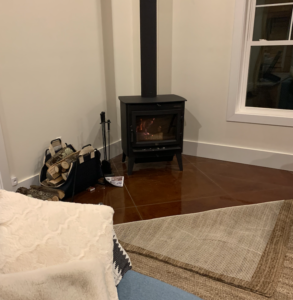
I took the photo above at our cabin in Maine. We bought the jute rug to create a cozy spot by our wood stove before we thought about just how flammable that woven material is. The thing's basically made out of kindling.
At first, we flipped the rug over (as you can see above) to keep it away from any sparks the fire might emit. Next, we considered buying a fireplace heat shield or spark arrestor to put over the rug over the cement floor. At last, we decided to see what would happen if we rearranged the furniture to face the stove on the diagonal. This way, the rug would be far enough away from the heat to assure our safety. Coming up with that last idea felt like a win.
Rather than thinking about the flaming rug as a problem, we looked at it as a puzzle. I realized that our new point of view gave us two distinct advantages. First, it took away the stress of having something we didn't want. Second, it allowed us to open ourselves up to creative possibilities.
I work with lots of people I admire. In particular, one couple here (let's call them BF and LF-- Hi, BF and LF!) sees everything as a puzzle. In the beginning of the diving season, I came to them with a question about designing and making custom shammies for my team. I explained some of the difficulties involved in my gift idea:
- These towels go in hot and cold water regularly.
- They get wrung out.
- They get rubbed on people's skin.
- They don't dry out quickly.
- They often get put in bags with things that are also wet but shouldn't get paint on them.
Rather than look defeated by my long list of qualifications, my friends seemed to get more animated and excited. It was as if with each new need I named, I was gifting them with a more exciting project. These friends, probably because they view everything as a puzzle to be solved rather than a problem that could stymie them, can do anything and are good at everything. They see nothing as obstacles, so nothing gets in their way.
I was listening to The Puzzler with AJ Jacobs, a podcast I highly recommend, and I heard the host say something about thinking of challenges as puzzles not problems. The more I consider his advice, the more important I believe it is in every aspect of a person's life.
- People take on puzzles for fun.
- We believe we can solve puzzles, so we're willing to put time and effort into figuring them out.
- Solving a puzzle feels like a huge W.
- Puzzle-solving is good for long-term brain health.
- Puzzles are way more fun than problems.
When we think about issues as problems, we might be tempted to ignore of avoid, neither of which approach helps anything. When we think of them as puzzles, we roll up our sleeves and enjoy the efforts we put in seeking solutions.
Can you think of a time you were posed with an obstacle you thought of as a puzzle rather than as a problem? How'd that go? Any suggestions? Please share your responses in the comments.
I love this framing!
You know me, always looking for a reframe!